Witch Hunter and Warhammer Fantasy
Warhammer Fantasy? What is that and what has it got to do with the audio adventures of Ludlov and Samina? Allow me to explain.
Every creative endeavour has its influences. George Lucas lists Flash Gordon, Akira Kurosawa and the works of Joseph Campbell as some of his most important inspirations for the Star Wars saga.
Witch Hunter is no different. In a series of articles I will talk about the influences on Witch Hunter, why I went to those sources and what they are all about.
Warhammer Fantasy is one of those influences. In a way, it’s the most obvious one.
The Warhammer World
Originally, Warhammer was a tabletop hobby game in which two players take command of an army of fantasy warriors. Players collect and paint miniatures to create their armies and play out epic battles on playing fields that resemble maquettes, including miniature trees, hills and buildings. The game rules are quite complex and attempt to realistically simulate what such a battle would look like. The hobby began somewhere in the seventies and it still exists, even though the company that makes the games has since moved in a different direction.
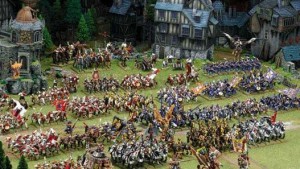
To make the battle game more interesting and more fun, the developers developed a whole world around it, including an impressive history of all the peoples and countries in it. This in itself is nothing new, but what makes the Warhammer world a bit more unique compared to other fantasy settings, is its very European renaissance setting. Most fantasy settings take their inspiration straight from Tolkien or Dungeons & Dragons. Warhammer went for a fantasy version of the Holy Roman Empire, a specific time and place in history that is very recognisable.
Secondly, the Warhammer universe has a very dark, gothic feel to it. This is interesting when you compare it to the German roleplaying game Das Schwarze Auge (The Dark Eye) which is also set in a kind of 16th century German atmosphere, but it has a very light and fairy-tale like tone, which brings to mind the works of the brothers Grimm. Warhammer contains these Grimm-like elements also but presents them in a very “grim” way.
The Roleplaying Game
Now, where Warhammer really caught my eye was not so much the wargame, but the roleplaying game. Warhammer Fantasy Roleplay is a very interesting tabletop roleplaying game that moves its focus away from the over-the-top battles of the wargame and instead tells the story of the adventures of ordinary people in the world of Warhammer.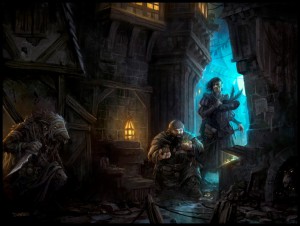
Players can embody the roles of rat-catchers, ferrymen, peasants and bounty hunters, but they can learn to become priests, captains, and yes, witch hunters.
The Warhammer roleplaying game has a more subdued and mysterious tone that really evokes its setting in a brilliant way. It’s gloomy, but also humorous.
The Cities
What appealed to me in this setting was its atmosphere. In particular, I love how the artwork for these games depicts cities as enormous, overpowering and dark. I’m no lover of big cities in real life, but there is something about these fantasy locations that really strikes me as strangely attractive in all their darkness and oppression.
The illustrations of Altdorf, the capital of the Empire where most of the Warhammer adventures take place, really spark my imagination. It suggests a place full of mysterious alleyways and hidden buildings, where shocking discoveries and perils lurk around every corner. Simultaneously, it is a testament to mankind’s cultural aspirations and the peak of civilisation. This dichotomy intrigues me as well.
In short, Altdorf was a great source of inspiration for Sevenpeaks.
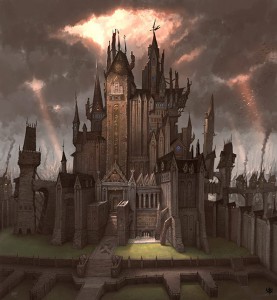
Witch Hunters
Witch Hunters are also a prevalent aspect of the Warhammer world. They tend to have an iconic look, with the tall hat that Ludlov also wears. At the time, I was completely unaware of Robert E. Howard’s character Solomon Kane, who actually inspired the Warhammer witch hunters, but I did recognise that the Warhammer witch hunters were inspired by the actual witch-hunts that took place in the 16th and 17th centuries and their outfit was based purely on the typical clothing of puritans of that era.
In Warhammer, the witch hunters are an institution. They are not quite as organised as they are in my setting, but they do form an important part of the civilisation of the empire and everyone recognises this.
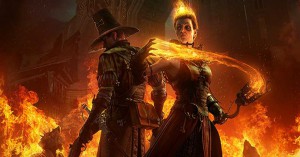
I liked the idea raised in the Warhammer lore that the witch hunters were every bit the dangerous extremists that modern culture would make them out to be BUT they actually did kind of have a valid point to their extremism. In the Warhammer world, illicit magic is a very real danger and it can and does lead to horrible consequences. In the modern world, the term “witch hunt” is used to refer to dishonest, phony trials, scapegoating and superstitious fear where there is nothing to be feared. I personally generally have a less than enthusiastic view of modernity and I have to admit that there is something about the way Warhammer portrays the witch hunters that makes me smile. What if there really is a magical danger? Wouldn’t witch hunters be seen as an important line of defence? Everyone would be afraid of them but they would understand their necessity.
Then again, in the story of Witch Hunter, I certainly didn’t want to glorify these dark and disturbing characters. That’s why tried to create a more nuanced situation where good and evil people can be found both among the magicians and among the witch hunters.
Influences and departures
The Warhammer world is wonderfully atmospheric and it has certainly played an important role in my creation of the Witch Hunter world. However, I never intended to make a Warhammer audio drama or even to mimic its style. There are some key ways in which I deliberately stayed away from the influences of Warhammer.
One of these is the level of high fantasy. The Warhammer world is very over-the-top. There are guys wearing armour with shoulder pads ten times the size of their heads and the sheer amount of skulls everywhere borders on self-parody.
Just try and count the skulls in this picture!
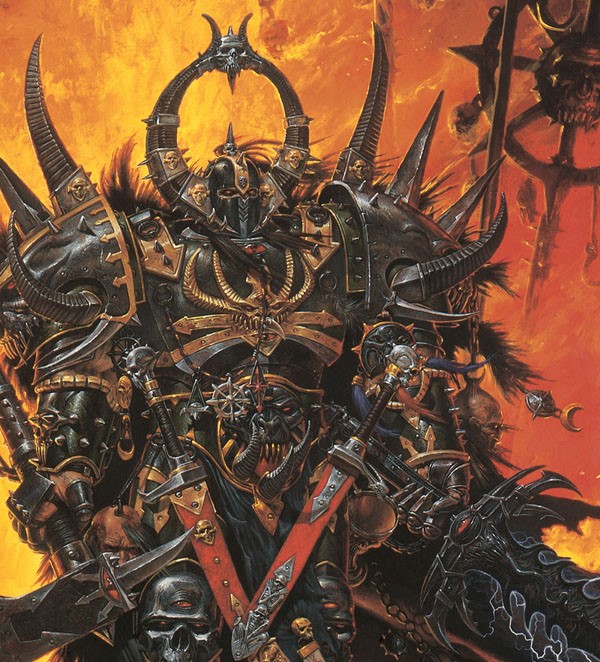
I found more than 20 skulls.
I have no problem with Warhammer’s approach but this style is absolutely not fit for the more thoughtful story I wanted to tell. The Witch Hunter universe is much more toned down and earthy. I wanted the fantasy elements of the story to feel truly magical, and I felt that could be achieved best by not plastering them all over every single scene.
Simultaneously, I would say that Witch Hunter is also more spiritual. While religion plays an important role in the Warhammer world, it isn’t really explored in a meaningful way. I know there are some metaphysical ponderings in some of the roleplaying books, but they stay very far away from anything I personally relate to. In Witch Hunter, I really wanted the whole conflict to be based on serious discussions about theology. I wanted the listener to feel that the actions of the witch hunters were not simply the result of stupidity and irrational hatred, because that allows us to distance ourselves from it and keeps it in the realm of pure escapism. The best fantasy is truth disguised as escapism, and for that reason I wanted the motivations of the witch hunters to be believable and understandable.
Thirdly, there is an element of cynicism in the Warhammer universe. It’s a hopeless universe, where Chaos is ultimately unstoppable and all comes to ruin. Seriously, last year the game developers have actually ended the traditional line of Warhammer games, destroyed the universe and started over with Warhammer: Age of Sigmar, which is more of an abstract multi-dimensional type of “space fantasy” universe that has nothing to do anymore with the renaissance world of the original. Needless to say, I don’t like what they did.
I certainly didn’t want this kind of nihilism in my story. Witch Hunter takes place in a world that is fallen, but not without grace, much like I view our own world. I wanted to take the story into some very dark places but always with a slight ray of hope at the end of the tunnel.
All in all, Warhammer’s influences on Witch Hunter are very clear but they are also relatively shallow. I will be mentioning other influences in future articles. These may not be as clearly recognisable, but they are ultimately more important. Still, the Warhammer universe is really what prompted me to start working on this story, because it was an influence of atmosphere. And for me, all stories begin with my desire to evoke a powerful sense of time and place, usually a very mysterious and fantastical one. Warhammer absolutely did that for me.
Are you curious about Witch Hunter? Listen to the first chapter free on Bandcamp! The entire audiobook is also for sale there.
